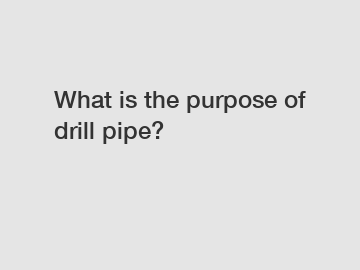What is the purpose of drill pipe?
What Is the Purpose of Drill Pipe? .
Drill pipe plays a crucial role in the drilling industry, serving multiple purposes that are essential for the extraction of natural resources from the earth. This article aims to explore the various functions and significance of drill pipe in the drilling process. .
1. Transferring drilling fluid and torque:

The primary purpose of drill pipe is to facilitate the transfer of drilling fluid from the surface to the bottom of the well. Drilling fluid, also known as "mud," holds immense importance as it acts as a lubricant, cools the drill bit, and carries cuttings back to the surface. Drill pipe provides a conduit for the continuous circulation of this fluid, enabling efficient drilling operations. Additionally, drill pipe also transmits torque from the surface equipment to the drill bit, causing the rotation necessary for drilling.
2. Housing the drill bit:
At the bottom end of the drill pipe resides the drill bit, which is responsible for cutting through rocks and other formations. The drill pipe acts as a housing for the drill bit, keeping it in position and providing stability during the drilling process. The strength and durability of the drill pipe are vital here, as it must withstand the tremendous pressure and forces exerted by the drill bit as it penetrates the earth's crust.
3. Supporting the weight of the drill string:
The drill string refers to the combination of the drill pipe, drill collars, and the drill bit. It is made up of multiple lengths of interconnected drill pipe. Besides transmitting drilling fluid and torque, the drill pipe also supports the weight of the entire drill string. As the length of the drill string can reach several kilometers in deep drilling operations, the drill pipe must possess high tensile strength to bear the load without any deformation or failure.
4. Facilitating directional drilling:
Directional drilling has revolutionized the oil and gas industry by allowing access to reservoirs in unconventional locations. It involves deliberately deviating the wellbore path from a vertical orientation. Drill pipe plays a significant role in directional drilling by transmitting the necessary equipment known as "measurement while drilling" (MWD) tools. These tools provide real-time data about the well's direction, inclination, and other vital parameters. With the help of drill pipe, these tools can be accurately positioned downhole to guide the drilling process and ensure that the well reaches its target.
5. Withstanding harsh drilling conditions:
Drill pipe is subjected to extreme conditions during drilling operations. Whether it be high pressures, abrasive rocks, or corrosive environments, the drill pipe must withstand it all. Consequently, the materials used for drill pipe fabrication are carefully selected for their strength, resistance to wear, and corrosion properties. Materials like high-strength steel alloys are commonly employed to ensure the required durability and longevity of the drill pipe in challenging drilling environments.
In conclusion, drill pipe plays a pivotal role in drilling operations, serving multiple purposes vital for successful and efficient resource extraction. It facilitates the transfer of drilling fluid and torque, houses the drill bit, supports the weight of the drill string, enables directional drilling, and withstands harsh drilling conditions. The significance of drill pipe cannot be overstated, as it ensures the steady progress of drilling operations, contributing to the energy production and exploration industry as a whole.
For more information, please visit heavy weight drill pipe, water well drill pipe suppliers, welded heavy weight drill pipe supplier.
231
0
0

Comments
All Comments (0)